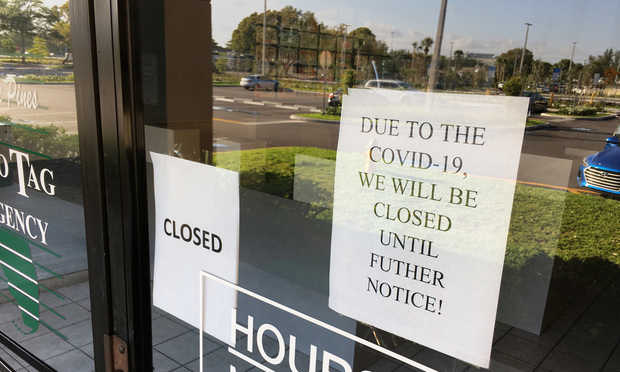'Learning as We Go,' Law Firms Struggle to Stay Up to Date on COVID-19 Guidance, Protocols
"We've had a steep learning curve with no playbook," Florida Bar president John Stewart said.
April 02, 2020 at 05:00 AM
7 minute read
 Pembroke Pines Tag Agency, like many businesses across the U.S., is closed due to the COVID-19 outbreak. (Photo: J. Albert Diaz/ALM)
Pembroke Pines Tag Agency, like many businesses across the U.S., is closed due to the COVID-19 outbreak. (Photo: J. Albert Diaz/ALM)
At 5 p.m. March 19, Pennsylvania Gov. Tom Wolf released a short proclamation ordering that all nonessential businesses close in response to the rapid transmission of the novel coronavirus.
When Fox Rothschild chairman Mark Silow saw the order, he immediately began scrambling. Not because the mandate came as a surprise—the firm has offices all over the country and similar orders had been filed in states such as California—but because the terse letter made no carve-out for law firms as essential businesses. What did this mean for the courts? What about the small skeleton crews that had been popping into the office to collect mail and maintain the servers that were working hard to keep the entirely remote firm connected?
"We have five offices in Pennsylvania and weren't sure about the scope. It was brief," Silow said. "In other places it tended to be more detailed."
At the same time, Theodore Simon, a veteran criminal defense attorney in Philadelphia and past president of National Association of Criminal Defense Lawyers, began immediately drafting a letter from his home, imploring the governor to ensure that criminal defendants would be afforded representation despite the fact that the order did not classify attorneys as essential.
"I remember sitting there at 5 p.m. on Thursday and I immediately went to work," Simon said. "Whether others were doing it or not, I had to do it. It was necessary, critical."
Similar scenarios have played out across the country as courts and local governments scramble to respond appropriately to the rapidly changing conditions surrounding the spread of COVID-19. Without much federal guidance to go on, states have come up with their own, creating a patchwork of varying orders.
Not only do those orders vary by location, but they change daily, so keeping up with them is a never-ending task for law firm managers.
The federal government has not yet issued a nationwide shelter-in-place order. Although several states including California, New York and, most recently, Florida, have issued statewide closures orders, many have not.
And while the American Bar Association has loosened guidance on online legal education and regularly publishes COVID-related webinars and news, the organization has not issued much concrete guidance to the scrambling state bars, firms and law schools—the latter of which has been grappling with a heated debate over grading systems.
In the weeks since, the pace has become no less frantic: State supreme courts have been handing down guidance and interpretations almost every day, and many states have allowed their courts, and even individual judges, to have relatively broad discretion on rules and procedures.
State courts, for example, have been largely closed in Pennsylvania. But federal courts in the state have fought to stay open, closing only when courthouse workers report having contracted the virus.
It wasn't until midday March 20 that the Administrative Office of Pennsylvania Courts handed down guidance allowing exemptions for attorneys, staff and clients performing "essential" functions. Even then, it took a few days of correspondence with the governor's office to ensure that Fox Rothschild was allowed to maintain basic operations in its Pennsylvania locations, according to Silow.
"I've been practicing for over 40 years and this is the most challenging thing I've ever faced. We're all learning as we go," he said.
In the week since, the Pennsylvania Supreme Court has been releasing near-daily guidance on everything from what can be classified as an essential function to rules about fast tracking appeals.
Fox Rothschild has been staying on top of the constant changes through delegation: The firm has a dedicated group that has been putting together a spreadsheet of local rules and operational changes as well as changes relating to tax law, a strong practice for the firm. The sheet is updated constantly.
Philadelphia-based Ballard Spahr has set up a similar system, wherein the firm's research team tracks changes to deadlines and procedures to disseminate firmwide as a daily report. But everything is moving so fast that interpretations sometimes have to be made on the fly.
"We've had lawyers in judges' courtrooms when a report comes out and they interpret it right there," managing partner Mark Stewart said.
In other states such as Florida, which closed all nonessential businesses Monday, the state's bar association has taken the lead on disseminating information on CLE extensions, legal service exemptions and court procedures. The Florida Bar website has posted all eight of the Florida Supreme Court rulings and all of the circuit and federal court operational changes, which vary county by county, district by district and even judge by judge.
Many Florida courts, for example, are leaving it to the judge's discretion as to whether deadlines get postponed.
"We've all been getting very quickly up to speed," Florida Bar president John Stewart said. "We've had a steep learning curve with no playbook."
The Florida Bar has even gone a step further and handed over member emails organized by county and circuit to the state's clerks of court so that each court could reach out directly to members based on their jurisdiction. Stewart said the move was crucial as to not overwhelm attorneys with information that isn't pertinent to their practices.
"Our goal has been to provide information to our members and, when appropriate, to the public, without overwhelming them," Stewart said.
For transactional attorneys, the churn of information is often taking place on the legislative level.
Like other firms, San Francisco-based Farella Braun + Martel has set up a research team to keep the firm abreast of the changing landscape. Each day firm attorneys are fielding questions around business interruption insurance, the feasibility of construction projects and the availability of loans and grants. But because both the state and federal governments have been furiously passing stimulus legislation, advice has to be updated constantly.
"Things have changed so rapidly over the last couple weeks advice you gave one day would change the next day because new legislation has passed," said Farella managing partner Brian Donnelly.
And with everything that's going on, lawyers have been also dealing with the challenge of transitioning their entire practice remotely in the span of two weeks. Miami-based K&L Gates partner Elisa D'Amico has been keeping updated on Twitter and Instagram, which she has found to be the fastest way to get new information. But she, like thousands of attorneys across the country, has found it difficult to stay completely up to date while balancing client needs and homeschooling.
"I have many jobs now, as we all do," D'Amico said. "I'm doing the best that I can and do things knowing that tomorrow it will be different."
Read More
Mandated Closures Have Law Firms Confused and Scrambling
'What Justice Requires': Federal Courts in Pa. Fight to Stay Open Amid Coronavirus Outbreak
This content has been archived. It is available through our partners, LexisNexis® and Bloomberg Law.
To view this content, please continue to their sites.
Not a Lexis Subscriber?
Subscribe Now
Not a Bloomberg Law Subscriber?
Subscribe Now
NOT FOR REPRINT
© 2025 ALM Global, LLC, All Rights Reserved. Request academic re-use from www.copyright.com. All other uses, submit a request to [email protected]. For more information visit Asset & Logo Licensing.
You Might Like
View All
KPMG Wants to Provide Legal Services in the US. Now All Eyes Are on Their Big Four Peers



K&L Gates Sheds Space, but Will Stay in Flagship Pittsburgh Office After Lease Renewal
Law Firms Mentioned
Trending Stories
- 1'It's Not Going to Be Pretty': PayPal, Capital One Face Novel Class Actions Over 'Poaching' Commissions Owed Influencers
- 211th Circuit Rejects Trump's Emergency Request as DOJ Prepares to Release Special Counsel's Final Report
- 3Supreme Court Takes Up Challenge to ACA Task Force
- 4'Tragedy of Unspeakable Proportions:' Could Edison, DWP, Face Lawsuits Over LA Wildfires?
- 5Meta Pulls Plug on DEI Programs
Who Got The Work
Michael G. Bongiorno, Andrew Scott Dulberg and Elizabeth E. Driscoll from Wilmer Cutler Pickering Hale and Dorr have stepped in to represent Symbotic Inc., an A.I.-enabled technology platform that focuses on increasing supply chain efficiency, and other defendants in a pending shareholder derivative lawsuit. The case, filed Oct. 2 in Massachusetts District Court by the Brown Law Firm on behalf of Stephen Austen, accuses certain officers and directors of misleading investors in regard to Symbotic's potential for margin growth by failing to disclose that the company was not equipped to timely deploy its systems or manage expenses through project delays. The case, assigned to U.S. District Judge Nathaniel M. Gorton, is 1:24-cv-12522, Austen v. Cohen et al.
Who Got The Work
Edmund Polubinski and Marie Killmond of Davis Polk & Wardwell have entered appearances for data platform software development company MongoDB and other defendants in a pending shareholder derivative lawsuit. The action, filed Oct. 7 in New York Southern District Court by the Brown Law Firm, accuses the company's directors and/or officers of falsely expressing confidence in the company’s restructuring of its sales incentive plan and downplaying the severity of decreases in its upfront commitments. The case is 1:24-cv-07594, Roy v. Ittycheria et al.
Who Got The Work
Amy O. Bruchs and Kurt F. Ellison of Michael Best & Friedrich have entered appearances for Epic Systems Corp. in a pending employment discrimination lawsuit. The suit was filed Sept. 7 in Wisconsin Western District Court by Levine Eisberner LLC and Siri & Glimstad on behalf of a project manager who claims that he was wrongfully terminated after applying for a religious exemption to the defendant's COVID-19 vaccine mandate. The case, assigned to U.S. Magistrate Judge Anita Marie Boor, is 3:24-cv-00630, Secker, Nathan v. Epic Systems Corporation.
Who Got The Work
David X. Sullivan, Thomas J. Finn and Gregory A. Hall from McCarter & English have entered appearances for Sunrun Installation Services in a pending civil rights lawsuit. The complaint was filed Sept. 4 in Connecticut District Court by attorney Robert M. Berke on behalf of former employee George Edward Steins, who was arrested and charged with employing an unregistered home improvement salesperson. The complaint alleges that had Sunrun informed the Connecticut Department of Consumer Protection that the plaintiff's employment had ended in 2017 and that he no longer held Sunrun's home improvement contractor license, he would not have been hit with charges, which were dismissed in May 2024. The case, assigned to U.S. District Judge Jeffrey A. Meyer, is 3:24-cv-01423, Steins v. Sunrun, Inc. et al.
Who Got The Work
Greenberg Traurig shareholder Joshua L. Raskin has entered an appearance for boohoo.com UK Ltd. in a pending patent infringement lawsuit. The suit, filed Sept. 3 in Texas Eastern District Court by Rozier Hardt McDonough on behalf of Alto Dynamics, asserts five patents related to an online shopping platform. The case, assigned to U.S. District Judge Rodney Gilstrap, is 2:24-cv-00719, Alto Dynamics, LLC v. boohoo.com UK Limited.
Featured Firms
Law Offices of Gary Martin Hays & Associates, P.C.
(470) 294-1674
Law Offices of Mark E. Salomone
(857) 444-6468
Smith & Hassler
(713) 739-1250










